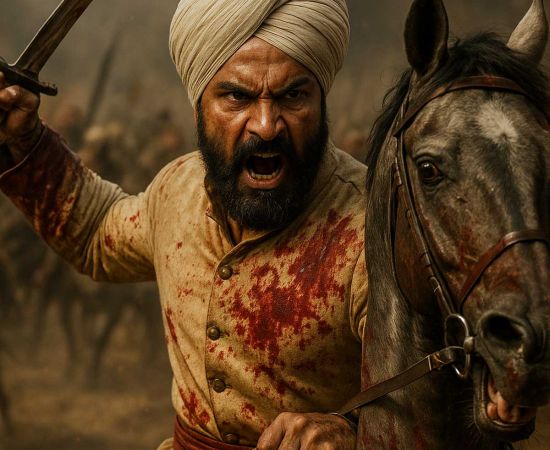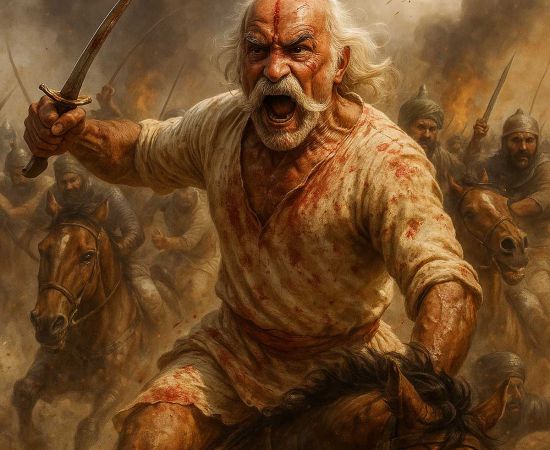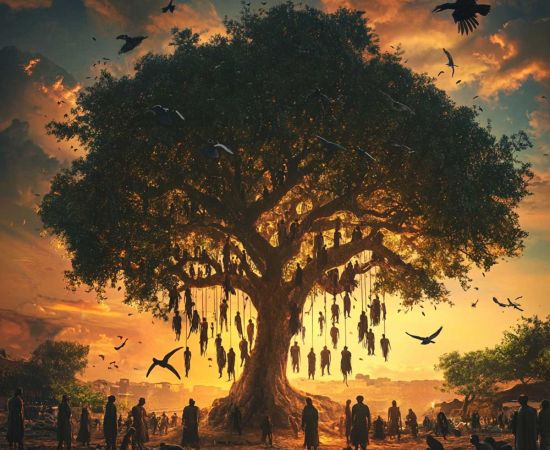MORE COVERAGE
Twitter Coverage
Satyaagrah
Written on
Satyaagrah
Written on
Satyaagrah
Written on
Satyaagrah
Written on
Satyaagrah
Written on
JOIN SATYAAGRAH SOCIAL MEDIA
"The final battle of Karbala is yet to come": Islamists raised chilling banners with dire warnings, inciting Muslims to fight against 'kafir' Hindus in Maharashtra's Satara district, where SP Samir Sheikh has previously also not acted in similar incidents

Recent events in the Maharashtrian town of Satara have raised serious concerns about communal harmony, following the emergence of provocative posters in one of the town’s busy squares. These posters, which have stirred considerable anxiety among the local populace, seem to incite the Muslim community to prepare for what is referred to as the ‘Battle of Karbala’.
|
The situation gained widespread attention after the X account, Legal Rights Observatory (LRO), shared images of these posters. The visuals displayed inflammatory slogans that starkly call upon Muslims to ready themselves for a confrontation in Satara, with the insinuation that their adversaries would be non-Muslims, likely Hindus.
One of the posters carried a particularly bold message, urging Muslims not to fear: “Don’t be afraid, Muslims. The honour of the Almighty remains, Islam is still alive, and the Quran endures. What do these tyrants think of themselves for clashing with us daily? The final battle of Karbala is yet to come,” it declared. This rhetoric hints at a deep-seated grievance and a call to action, which could potentially escalate tensions if not addressed promptly.
Adding to the urgency of the situation, the LRO's official X account reported: “Huge banners propped up at #Karad in #Satara dist under @SataraPolice advising Muslims to prepare for the battle of Karbala and obliquely terming #Hindus as Zaalim i.e. atrocious, tyrant! Now all eyes are on SP Samir Sheikh whether he cracks the whip or lets them go on rioting to wipe out ‘tyrant’ kafir Hindus!” This tweet underscores the critical role of local law enforcement in managing the situation and preventing any outbreak of violence.
In a significant development, the Legal Rights Observatory (LRO) has urgently called upon key political and law enforcement figures, including Devendra Fadnavis, Amit Shah, Prime Minister Narendra Modi, and local police officials, to respond decisively to the concerning appearance of provocative posters in Satara. Highlighting a previous incident of concern, LRO stated, “Last time same SP flatly ignored action against those providing mobile numbers of local Hindu activists to #Pakistani radicals who called and threatened them with dire consequences!” This plea underscores the gravity with which LRO views the current situation, urging an immediate and robust response to prevent further escalation.
|
Kabala battle was fought between Shia and Sunni Muslims, but it is often used as a rallying cry to mobilise Muslims against infidels
For those unfamiliar with the historical context, the Battle of Karbala was a pivotal conflict fought between the two main sects of Islam, Shias and Sunnis, who clashed fiercely to assert their dominance and establish religious authority. In this battle, Shias, regarded by Sunnis as heretics and apostates, faced off against the forces of the Sunni Umayyad Caliph Yazid I. This conflict saw the Sunni forces pitted against a smaller, determined army led by Husayn ibn Ali, the grandson of Prophet Muhammad. This battle is seen very differently by Sunni and Shia Muslims; for Shias, it marks a definitive and irreversible break from Sunni Islam.
Although the Battle of Karbala primarily involved an internal conflict within Islam, it has been appropriated in modern times as a metaphorical call to arms by some Islamists, who use its historical significance to issue rallying cries against non-Muslims. These references to Karbala serve to evoke a sense of historical grievance and impending conflict, aiming to unite Muslims against perceived external enemies, often labeling them with the pejorative term "kafirs" (infidels), and at times even threatening genocidal actions. Such usage of the battle’s legacy illustrates how historical events are reinterpreted and utilized in contemporary religious and political rhetoric.
On the 31st of January, a speech given by Mufti Salman Azhari in Junagadh, Gujarat, caused a stir, especially following its spread across social media platforms. In this 56-minute address, Azhari made several contentious remarks that were widely perceived as derogatory towards the Hindu community. His speech notably followed the Pran Pratishtha ceremony at the Ram Mandir in Ayodhya, an event marking a significant moment for Hindus, who reclaimed the site nearly thirty years after the demolition of the Babri structure. This structure itself was historically contentious, believed to have been built during the Mughal era atop the ruins of an earlier temple.
During his address, Azhari made a pointed reference to the ongoing religious and cultural tensions: “The final battle of Karbala is yet to come… a moment of silence, then there will be noise again. The dogs are having their time today. Our time will come tomorrow.” This statement, evoking the imagery of conflict and retribution, echoed deeply within the community, especially given its timing after such a significant religious event for the Hindu community.
Azhari also commented on historical actions regarding religious sites, specifically addressing the conversion of temples into mosques by Islamic invaders, a sensitive and historically charged topic. He stated, “If you keep idols inside a mosque, then, it will not become an idol-worshipping place (referring to temples),” defending the historical practice of altering religious structures from one faith to another.
Continuing his address, he referenced the pre-Islamic history of the Kaaba, a site of immense significance in Islam, to make a broader point about religious continuity and identity, “You have kept one idol (at Ram Mandir) but there were 360 idols at Kaaba. Even then, the Kaaba belonged to the Muslims. This did not stop the Islamic pilgrimage of Hajj,” he asserted, drawing a parallel to suggest that the presence of Hindu idols at a historically contested site like Ayodhya does not alter its Islamic significance.
Azhari further rallied the Muslim community, urging them to recognize and reclaim their religious spaces, “…Dear Muslims, the revolution will begin from your homes. They (Hindus) do not dare to convert your mosques to idol-worshipping places (referring to temples). You have yourself abandoned the mosques,” he remarked, emphasizing a call to action that resonated with his audience, urging them to engage more actively with their places of worship and cultural heritage.
In a continuation of the inflammatory rhetoric surrounding religious and cultural conflicts, another incident has come to light involving Mufti Salman Azhari, who made a stark comparison involving the Hindu community. Referring to them derogatorily, he stated, “We have a saying – When the ground is left open, dogs take over the place. But if you keep using the ground, then, they won’t become the shelter for dogs.” This analogy, equating the unclaimed ground with a territory potentially overrun by what he referred to as 'dogs', starkly illustrates his contentious stance on inter-religious territorial claims.
Further stoking the flames of discord, in January 2023, Gulam Rasool Balyavi, a member of the Legislative Council from Janata Dal (United), made a vehement declaration. Addressing a crowd in Hazaribagh, Jharkhand, he explicitly threatened that Islamists would escalate their responses to perceived affronts by turning every city into a battleground reminiscent of 'Karbala' if any disparaging remarks were directed at Prophet Muhammad. Balyavi's statement came in the context of past controversies surrounding comments made about the Prophet, which had previously incited a wave of threats against those perceived as offenders by certain groups within the Muslim community.
Specifically, Balyavi referenced a past incident involving Nupur Sharma, a former BJP politician whose comments about Prophet Muhammad led to severe backlash, including death and rape threats from various quarters across the globe. In his fiery speech, he made it clear: “We are in Karbala ground…if you disrespect our Prophet, we will turn cities into Karbala,” directly calling for violent retribution against anyone labeled a blasphemer by Islamic fundamentalists.
These developments highlight the deep-seated tensions and the volatile nature of religious sentiments, which can rapidly escalate into significant confrontations, impacting social harmony and community safety. The use of charged language and historical metaphors such as 'Karbala' not only evoke strong emotions but also signify the profound divisions that can lead to communal strife. As such, these utterances are not just mere comments but potent catalysts for broader social and political movements, reflecting the intense interplay of history, religion, and identity in current times.
 |
 Support Us
Support Us
Satyagraha was born from the heart of our land, with an undying aim to unveil the true essence of Bharat. It seeks to illuminate the hidden tales of our valiant freedom fighters and the rich chronicles that haven't yet sung their complete melody in the mainstream.
While platforms like NDTV and 'The Wire' effortlessly garner funds under the banner of safeguarding democracy, we at Satyagraha walk a different path. Our strength and resonance come from you. In this journey to weave a stronger Bharat, every little contribution amplifies our voice. Let's come together, contribute as you can, and champion the true spirit of our nation.
 |  |  |
| ICICI Bank of Satyaagrah | Razorpay Bank of Satyaagrah | PayPal Bank of Satyaagrah - For International Payments |
If all above doesn't work, then try the LINK below:
Please share the article on other platforms
DISCLAIMER: The author is solely responsible for the views expressed in this article. The author carries the responsibility for citing and/or licensing of images utilized within the text. The website also frequently uses non-commercial images for representational purposes only in line with the article. We are not responsible for the authenticity of such images. If some images have a copyright issue, we request the person/entity to contact us at This email address is being protected from spambots. You need JavaScript enabled to view it. and we will take the necessary actions to resolve the issue.
Related Articles
- Nupur Sharma untraceable: Maharashtra police stationed in Delhi for 5 days but can’t find her after multiple complaints against her following her so-called offensive statements against Prophet Muhammad, which triggered countrywide violence by Muslims
- "ग़ुरूर-ओ-क़हर तलाक़": In a shocking twist, Kalyan's Sohail Shaikh gave triple talaq to his wife for refusing ₹15 lakh demands and sleeping with his boss, abusing her brutally, now facing charges under the 2019 Talaq Law and Bharatiya Nyaya Sanhita
- "दिलजले": Love Jihad in Uran, 22-year-old Yashashree Shinde was brutally murdered by Dawood Sheikh, her decomposed body found with severe mutilation of genitals & face near the Uran-Panvel railway line; Sheikh arrested at the Maharashtra-Karnataka border
- "मेरे घर आई एक नन्ही परी": In Maharashtra, another Hindu girl, Pooja Shivraj Pawar, a bright science student with a 96% distinction, tragically ended her life after relentless harassment by garage mechanic Qasim Pathan, sparking protests demanding justice
- "ख़ुदा हाफ़िज़": Javed Sheikh, facing marital issues, attempted to escape after deliberately drowning his wife Mamta (21), and two minor girls, Payal Devidas Kamble (16), and Swati Devidas Kamble (15), in a river in Nanded, arrested under IPC 304 and 34
- "ता-क़यामत कर्बला": 9 Bangladeshi women, arrested for illegal stay in India along with a local woman who sheltered them, highlighting the rising Islamization and violent crimes, including the drugging, kidnapping, torture, and rape of Hindu girls by them
- Plea of MP Navneet Rana and husband MLA Ravi Rana to quash FIR for the gruesome and heinous crime of reciting Hanuman Chalisa outside Matoshree dismissed by Bombay HC: Justices stated that it was devoid of merit
- "If Uttar Pradesh can remove the loudspeakers, so can Maharashtra. Loudspeaker is a social issue, not a religious one": Raj Thackeray addresses mega rally, reiterates May 3 deadline to remove loudspeakers from mosques
- "इश्क़बाज़": Shadab Tamboli, Yusuf Chaughule, Kunal Shirole, and Ayaz Pathan are charged with stalking, abducting, raping, and forcibly marrying a minor girl in Ahmednagar, igniting a police hunt that culminates in arrests and a high-profile court case
- "मज़ार का ज़िद्दी जुनून": An unauthorized mazar by Pune Airport forced a wall change, raising security fears—a complaint to Muralidhar Mohol flags traffic woes and a trend of illegal builds near vital spots like Mumbai and Navi Mumbai airports
- City Police booked Railway Police sub-inspector for celebrating his wife’s birthday by playing music on a Bluetooth speaker with his family in his own house while Azaan was playing in the Mosque nearby: Maharashtra
- "गुस्ताखियां": In Mumbai's Dharavi, RSS worker Arvind Vaishya was tragically stabbed to death in front of police; during his funeral, mourners and police faced stone-pelting by Islamists. Arrested individuals include Niyaz, Arif, Yasin, Saddam, and others
- "You cannot shake hands with a clenched fist": Muslim World League's Leader calls on India, a nation renowned for its cultural diversity and religious harmony, to aid in strengthening an International alliance of civilizations, reinforcing global peace
- Shocking inhumane incident: 16-year-old Hindu girl raped for five years by her step father Syed Ali and forced to sell embryos, facing sexual abuse since she was 12, shocking details of exploitation revealed during investigation
- Leftist culture of abuse and targeted attacks: Journalists and entertainers had to face Islamist harassment



























